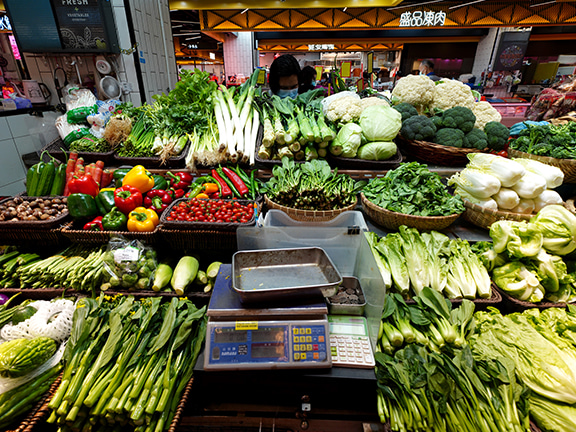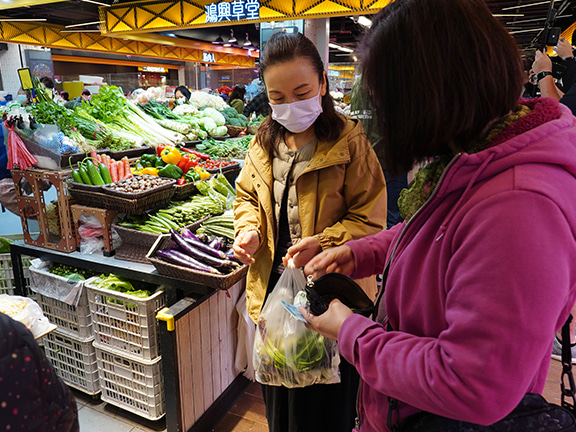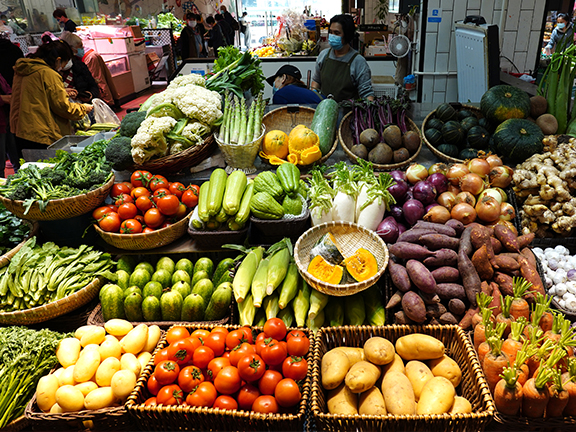Vegetables are essential and beneficial part of a healthy diet. However, Hong Kong has limited land resources and has historically relied on imported food. Increasing demand from Hong Kong residents for healthier food has therefore spawned the rise of local organic agriculture in recent years. There are now more than 130 certified local organic farms in Hong Kong! The vegetable stalls that mainly deal in local organic vegetables have also taken advantage of the trend. Among them, Grace Vegetable, which was established at Spot Mart in Tseung Kwan O at the beginning of 2020, expanded its business within less than a year, opening a second branch, called Farmer Land, at TKO Market in the same district at the end of 2020, hoping to further promote local vegetables.
Shoppers who come to Grace Vegetable can find all kinds of fresh vegetables with bright and dazzling colours, all meticulously placed to create an attractive visual effect. Part of this idea came from the owner, Mr Ho, who was originally engaged in design work in media. Influenced by his family, which ran a vegetable stall business, he decided to embark on the road of entrepreneurship and “organically” combined his professional experience with the vegetable stall business.
“My family has been in the local vegetable business for about 20 years, and they encouraged me to join,” said Mr Ho. “But I didn’t want to operate a vegetable stall that looks similar to everyone else’s. I wanted to be different. Because of my background in design, I always thought that I didn't need to follow the old model to operate a vegetable stall, so I decided to use my expertise to integrate design elements into the operation of my vegetable stall.
“For example, by arranging the vegetables by colour, the display can be more unique and beautiful, and the appearance attracts people to pay more attention to the local vegetables on offer! If you want to promote local vegetables, you have to think outside the box so that you can stand out.”

In general, people are paying more attention to their health, which has propelled young middle-class families to buy local vegetables. Therefore, when Mr Ho started his business, he decided to start it up in Tseung Kwan O because many young families live here, and modern markets, such as his starting point - Spot Mart, also have a sense of design, which mirrors his operation philosophy. As a down-to-earth owner, he has created a social media page for his vegetable stall on social media platforms, which has proven to be a success. “Some young housewives in the district noticed the page on social media and were attracted by the colourful photos of local vegetables, so they paid a special visit to the stall,” he said.
Grace Vegetable achieved a lot in less than a year after being established. At the invitation of Link, Mr Ho decided to expand his business to TKO Market in Hang Hau and opened a second branch, called Farmer Land.
“Hang Hau is a pass-through to Sai Kung and Clear Water Bay, so it attracts foreign residents of those areas who are drawn to clean markets and tidy stalls, and are more willing to spend money on healthy local organic vegetables. I feel satisfied with this business opportunity and think the potential is huge, so I decided to expand the business at TKO Market – just one station away from Grace Vegetable!” said Mr Ho.

In addition to the shorter transport distance and time, which ensures that local vegetables are fresher than imported vegetables, Mr Ho pointed out that vegetables certified as local organic vegetables in Hong Kong have higher requirements in all aspects.
“All local organic vegetables are subject to regular random inspections by Hong Kong Organic Certification Centre before they can be certified as organic, and the Agriculture, Fisheries and Conservation Department conducts daily random inspections for local vegetables, so the safety and health profiles of local vegetables are guaranteed to be good!”
Mr Ho admitted that local vegetables and imported vegetables are generally similar in quality, but it is not as easy to find local varieties. “Compared with imported vegetables, which have lower costs, provide higher profits and are plentiful, the cost of local vegetables is naturally higher, and the profits are not necessarily attractive.”
Mr Ho made a conscious decision to run a business selling local vegetables at local fresh markets just to make local vegetables more accessible to the general public at their daily neighbourhood market. This comes at a personal cost, though. He has to select and pick up the goods from the wholesale vegetable market at 3am and return to the fresh market before 7am to stock up! The life of running a local organic food stall is naturally more difficult than his previous work as a designer, but he is happy to take on the challenge. “I want to promote local vegetables to enable more Hong Kong residents, especially the younger generation, to eat them, so it is worth all the hard work, and I must persevere!”

The climate in Hong Kong is pleasant, and the city is green all year. It is this temperate weather that allows Hong Kong to grow vegetables for all seasons. “Eat melons in the summer and leaf vegetables in the winter”, as the local saying goes. Local farms in Hong Kong follow this guidance, and melons such as winter melons and pumpkins are planted more in the summer, and leaf vegetables such as watercress and lettuce are planted more in the winter.
Another special feature of local vegetables is that they look different compared to their non-local counterparts. Mr Ho took mint leaves as an example. The shape of Hong Kong local mint leaves is rounder than that of foreign varieties. Fresh local mint leaves are very sweet and can be used to cook scrambled eggs and make soup or fresh mint tea.